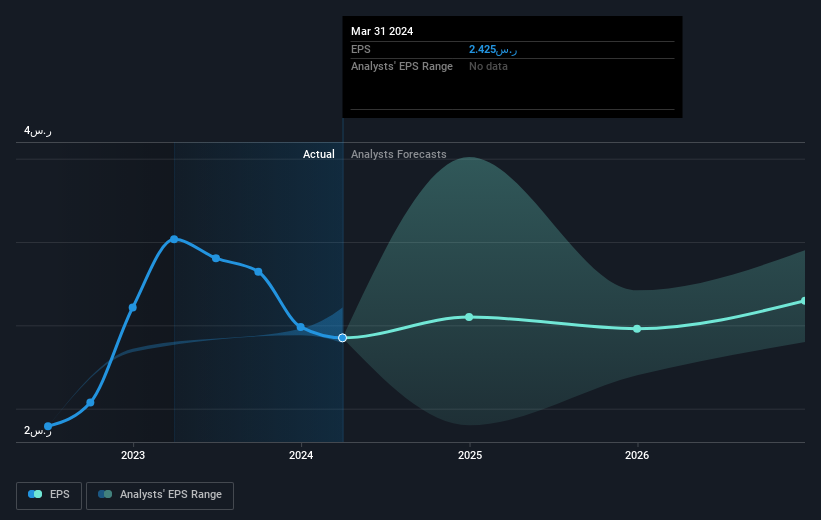- Saudi Arabia
- /
- Basic Materials
- /
- SASE:3030
Saudi Cement (TADAWUL:3030) sheds ر.س237m, company earnings and investor returns have been trending downwards for past five years

For many, the main point of investing is to generate higher returns than the overall market. But every investor is virtually certain to have both over-performing and under-performing stocks. At this point some shareholders may be questioning their investment in Saudi Cement Company (TADAWUL:3030), since the last five years saw the share price fall 36%. We also note that the stock has performed poorly over the last year, with the share price down 28%.
After losing 3.5% this past week, it's worth investigating the company's fundamentals to see what we can infer from past performance.
Check out our latest analysis for Saudi Cement
While markets are a powerful pricing mechanism, share prices reflect investor sentiment, not just underlying business performance. By comparing earnings per share (EPS) and share price changes over time, we can get a feel for how investor attitudes to a company have morphed over time.
Looking back five years, both Saudi Cement's share price and EPS declined; the latter at a rate of 1.0% per year. Readers should note that the share price has fallen faster than the EPS, at a rate of 9% per year, over the period. This implies that the market is more cautious about the business these days.
You can see how EPS has changed over time in the image below (click on the chart to see the exact values).

It might be well worthwhile taking a look at our free report on Saudi Cement's earnings, revenue and cash flow.
What About Dividends?
It is important to consider the total shareholder return, as well as the share price return, for any given stock. The TSR incorporates the value of any spin-offs or discounted capital raisings, along with any dividends, based on the assumption that the dividends are reinvested. So for companies that pay a generous dividend, the TSR is often a lot higher than the share price return. As it happens, Saudi Cement's TSR for the last 5 years was -16%, which exceeds the share price return mentioned earlier. The dividends paid by the company have thusly boosted the total shareholder return.
A Different Perspective
We regret to report that Saudi Cement shareholders are down 24% for the year (even including dividends). Unfortunately, that's worse than the broader market decline of 3.7%. Having said that, it's inevitable that some stocks will be oversold in a falling market. The key is to keep your eyes on the fundamental developments. Regrettably, last year's performance caps off a bad run, with the shareholders facing a total loss of 3% per year over five years. Generally speaking long term share price weakness can be a bad sign, though contrarian investors might want to research the stock in hope of a turnaround. It's always interesting to track share price performance over the longer term. But to understand Saudi Cement better, we need to consider many other factors. Take risks, for example - Saudi Cement has 1 warning sign we think you should be aware of.
But note: Saudi Cement may not be the best stock to buy. So take a peek at this free list of interesting companies with past earnings growth (and further growth forecast).
Please note, the market returns quoted in this article reflect the market weighted average returns of stocks that currently trade on Saudi exchanges.
New: Manage All Your Stock Portfolios in One Place
We've created the ultimate portfolio companion for stock investors, and it's free.
• Connect an unlimited number of Portfolios and see your total in one currency
• Be alerted to new Warning Signs or Risks via email or mobile
• Track the Fair Value of your stocks
Have feedback on this article? Concerned about the content? Get in touch with us directly. Alternatively, email editorial-team (at) simplywallst.com.
This article by Simply Wall St is general in nature. We provide commentary based on historical data and analyst forecasts only using an unbiased methodology and our articles are not intended to be financial advice. It does not constitute a recommendation to buy or sell any stock, and does not take account of your objectives, or your financial situation. We aim to bring you long-term focused analysis driven by fundamental data. Note that our analysis may not factor in the latest price-sensitive company announcements or qualitative material. Simply Wall St has no position in any stocks mentioned.
About SASE:3030
Saudi Cement
Manufactures and sells cement and related products in the Kingdom of Saudi Arabia and internationally.
Flawless balance sheet and good value.


